December 2023
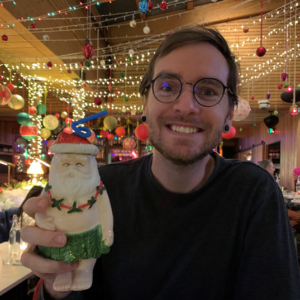
Adam Gordon-Fennell, PhD is a postdoctoral researcher in Dr. Garret Stuber’s lab in the Center of Excellence in Neurobiology of Addiction, Pain and Emotion (NAPE), where he studies the hypothalamic and dopaminergic circuits that shape motivation for food and drug rewards. His long-term goal is to lead a lab focused on isolating the neuronal circuits that shape motivation for food and drugs of abuse and use these insights to inform targeted therapeutic interventions.
Dr. Gordon-Fennell earned his PhD in Neuroscience from the University of Texas at Austin in Dr. Michela Marinelli’s lab supported by a National Science Foundation Graduate Research Fellowships Program grant. His thesis focused on understanding the role of the lateral preoptic area of the hypothalamus in regulating dopamine neurons and reward seeking behavior in rats. His work uncovered a novel role of the lateral preoptic area in driving cocaine- and food- seeking behaviors and revealed that the lateral preoptic area regulates midbrain dopamine neuron activity. He also created an outreach program with two other PhD students focused on teaching middle and high school students about the neuroscience of substance use disorder, which was provided to over 1,200 students primarily from disadvantaged backgrounds. His PhD research and public outreach taught him the importance of substance use disorder research and inspired him to seek out a lab to receive training in cutting edge approaches to measure and manipulate brain activity to further delineate the role of brain circuits in motivated behaviors such as those in substance use disorder.
Dr. Gordon-Fennell joined Dr. Stuber’s lab to learn how to employ two-photon imaging to study the single cell activity dynamics of hypothalamic neurons during motivated behaviors. To this end, he has developed a behavioral system designed to be used in conjunction with two-photon imaging (named OHRBETS) that features multiple head-fixed models for consumption and operant conditioning in mice and has recently published this work (Gordon-Fennell et al., eLife, 2023). He has helped several other labs set up and use OHRBETS and is involved in collaborations to expand the system to study novel behaviors in head-fixed mice. He is now generating new models of head-fixed drug self-administration and using these models to determine how the brain encodes motivation for food and drugs of abuse.
Outside the lab, you can find Dr. Gordon-Fennell in the kitchen making interesting pickled and fermented foods, listening to music, and hiking around Washington.
November 2023
Li Li, MD, PhD is an Assis tant Professor, pediatric anesthesiologist, and a new Principal Investigator at the Seattle Children’s Research Institute. He is thrilled to start his research program that aims to develop precision anesthesia by better understanding the brain’s arousal circuits and generating new technology to better modulate these circuits. His long-term goal is to produce anesthesia with reduced cardiorespiratory depression and decreased risk of perioperative neurocognitive disorders such as delirium. Additionally, he is strongly interested in developing physician-scientists in our field.
tant Professor, pediatric anesthesiologist, and a new Principal Investigator at the Seattle Children’s Research Institute. He is thrilled to start his research program that aims to develop precision anesthesia by better understanding the brain’s arousal circuits and generating new technology to better modulate these circuits. His long-term goal is to produce anesthesia with reduced cardiorespiratory depression and decreased risk of perioperative neurocognitive disorders such as delirium. Additionally, he is strongly interested in developing physician-scientists in our field.
Dr. Li completed his MD/PhD at Stanford, anesthesiology residency at UW, followed by a pediatric anesthesiology fellowship at Seattle Children’s. During residency, he worked in Drs. Marge Sedensky and Phil Morgan’s lab to examine a model of anesthesia-induced neurotoxicity in roundworms. He also worked with Dr. Deepak Sharma and Dr. Daniel Raftery to examine changes in brain metabolites from humans under anesthesia. After his clinical fellowship, he worked in Dr. Michael Bruchas’ lab to investigate the role of the noradrenergic system in anesthetic emergence and opioid-induced sleep disruptions. He appreciates all the mentorship he has received; and is excited to work with his new colleagues at the Center for Integrative Brain Research, and to continue his collaborations with the superb people at the UW Center of Excellence in Neurobiology of Addiction, Pain and Emotion (NAPE).
Outside of work, Li enjoys the natural beauty of the Seattle area, especially in seeing the snowy peaks towering in the distance on a clear day. He relishes cutting through the water in his origami kayak on Lake Washington with his daughter. From time to time, he delights in learning about the history of science and medicine. One of his recent favorite books is “When Breath Becomes Air” by the late Paul Kalanithi, a young neurosurgeon who faced his own mortality when diagnosed with metastatic cancer. In the book, Kalanithi writes ‘The days are long, but the years are short,’ a hopeful reminder that all difficult times will pass before long.
October 2023
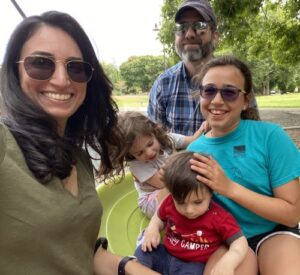
Mitra Heshmati, MD, PhD is an assistant professor whose research focuses on understanding how general anesthesia works in the brain. Dr. Heshmati’s lab is particularly interested in the intersection of anesthetic drug mechanisms with addiction, pain, and stress neural circuitry. Her long-term goal is to make significant contributions to anesthesiology and neuroscience by running a basic-translational research program as a physician-scientist. To do meaningful research, she continues to work with patients and allows clinical questions to guide her research.
Dr. Heshmati completed a combined BA/MS neuroscience program at Johns Hopkins before starting a medical scientist training program at Mount Sinai in New York. She was drawn to APM’s Bonica Scholars Program and the recent establishment of the NAPE Center so she moved to Seattle for her residency training in Anesthesiology. Fortuitously, Dr. Heshmati’s family was also drawn to UW; her partner has a neuroscience lab in the Department of Biological Structure and her sister is faculty at UW’s Foster School of Business.
At APM, Dr. Heshmati has enjoyed excellent mentorship from established clinicians and researchers. She continues to be supported by these mentors and the resources of the NAPE Center. She gives thanks to Leanne, Grace, Robert, Harriet, and all the research staff for keeping everything running smoothly.
While it took time for Dr. Heshmati to adjust to Seattle, she and her family have learned to adapt to PNW life (with the requisite Hawaii vacations/winter light reprieve). They could not imagine a better place to live. Dr. Heshmati’s kids are growing up in extraordinarily beautiful nature and do not hesitate to play in the rain!
September 2023

Daron Vandeleur, MD, is entering her second year as a T32 research fellow in the Pediatric Pain and Sleep Innovation laboratory of Dr. Tonya Palermo. She aims to become a clinical researcher in pediatric chronic pain.
Dr. Vandeleur’s interest in pain began during her undergraduate time at UW where she studied neurobiology and global health. She developed a clinical interest in pain during her pediatric residency training at UCSF. After residency she worked as a neonatal hospitalist and subsequently completed a chronic pain fellowship at the University of Washington. She now works clinically in the Seattle Children’s outpatient chronic pain clinic. As part of her fellowship training, Dr. Vandeleur is earning a master’s degree in epidemiology at UW.
Dr. Vandeleur’s research interest lies in the social and environmental context of pediatric pain and improving access to pain care. Dr. Vandeleur is particularly interested in mixed-methods data analysis and implementation science. Her current research projects include understanding the user experience of psychological digital health interventions and the transition from pediatric to adult pain care.
Dr. Vandeleur grew up in the Pacific Northwest and enjoys spending her free time with friends and family, eating delicious food, listening to music and generally being outdoors: backpacking, running, hiking, kayaking, gardening, and biking.
August 2023
This month we’re featuring 3 postdoctoral fellows in Dr. Rong Tian’s lab at the Mitochondria and Metabolism Center: Durba Banerjee, Melissa Herrero Bocco, and Akira Yoshii.
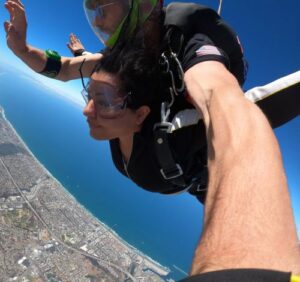 Durba Banerjee, PhD, earned her doctorate in zoology from the University of Calcutta. As a second-year postdoctoral fellow, Dr. Banerjee is studying the role of immune cells with mitochondrial defect in the pathologies of cardiac failure. Concurrently, she is engaged in researching the biological and molecular outcomes of mitochondrial transfer and heightened sensitivity to anesthetics in animals possessing dysfunctional immune cells.
Durba Banerjee, PhD, earned her doctorate in zoology from the University of Calcutta. As a second-year postdoctoral fellow, Dr. Banerjee is studying the role of immune cells with mitochondrial defect in the pathologies of cardiac failure. Concurrently, she is engaged in researching the biological and molecular outcomes of mitochondrial transfer and heightened sensitivity to anesthetics in animals possessing dysfunctional immune cells.
Dr. Banerjee earned her PhD in Zoology in the collaborative laboratories at the University of Calcutta and the Indian Statistical Institute in India. She concentrated on the function of specific transcription factors that dualistically regulate lipid and glucose metabolism in hypertrophied murine hearts induced by pressure overload. Dr. Banerjee’s in vivo studies included cardiomyocyte-targeted nano-encapsulation of deliverables aiming to modulate cardiac function without bystander effects.
Dr. Banerjee’s trip to Seattle from her hometown Kolkata in eastern India was her first solo-travel outside her country. Although she misses her husband Anupam, an internal medicine physician in India, she hopes to explore the Pacific Northwest with him in the near future. Outside of the lab, Dr. Banerjee is an ardent cook, plant-lover and loves capturing street portraits. The photo above is from her first skydiving experience in Oceanside, CA.
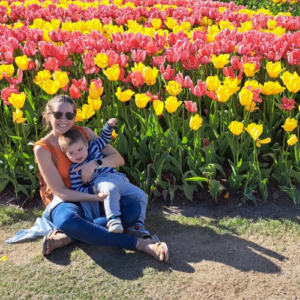 Melissa Herrero Bocco, PhD, is a dual citizen of Argentina and Italy, Dr. Herrero Bocco was awarded a PhD from the School of Molecular Cell Biology and Biotechnology at Tel Aviv University. Since joining the Tian lab in 2021, Dr. Herrero Bocco’s research is focused on understanding the involvement of mitochondria and cell metabolism dysfunction and their adaptative mechanisms in pathological scenarios.
Melissa Herrero Bocco, PhD, is a dual citizen of Argentina and Italy, Dr. Herrero Bocco was awarded a PhD from the School of Molecular Cell Biology and Biotechnology at Tel Aviv University. Since joining the Tian lab in 2021, Dr. Herrero Bocco’s research is focused on understanding the involvement of mitochondria and cell metabolism dysfunction and their adaptative mechanisms in pathological scenarios.
Dr. Herrero Bocco’s scientific training included studying biochemistry, molecular and cellular biology, and animal models. As an undergraduate student at Universidad Nacional del Litoral, Argentina, she conducted research in nutrition related metabolic diseases studying the effect of the acid α-linolenic rich dietary Salvia hispánica L. (chia) seed on dyslipidemia and lipotoxicity induced in rats. As a PhD student at Tel Aviv University, Dr. Herrero Bocco studied a rare genetic neurodegenerative pathology termed Vanishing White Matter (VWM). During her studies she discovered that partial loss of function in eIF2B, a translation initiation factor, leads to an intrinsic defect in oxidative phosphorylation (OXPHOS) in primary astrocytes and oligodendrocytes. This mitochondrial dysfunction impairs the functions and differentiation abilities of these glial cells, explaining why VWM mostly affects the brain white matter. Studying in Israel provided a unique opportunity to interact with people from different ethnicities, backgrounds, and religions and taught her about respect, tolerance and inclusion.
These experiences solidified Dr. Herrero Bocco’s interest in pursuing scientific research on the regulatory mechanisms related to the role of mitochondria and bioenergetics in disease progression. The fact that the heart is an organ with extremely high-energy demands and that cardiovascular diseases are one of the main causes of death worldwide motivated her to choose cardiomyocytes as a cell type to continue studying mitochondrial biology in health and disease. As a member of the Tian Lab, Dr. Herrero Bocco’s research focuses on understanding the role of extracellular mitochondria on Heart Failure with Preserved Ejection Fraction (HFpEF). Dr. Herrero Bocco hopes her research will contribute to conceptual and technical training in mitochondria biology and cell metabolism, and will provide a solid foundation toward achieving her long-term goal of transforming molecular insights into a therapeutic modality for human diseases.
In her free time, Dr. Herrero Bocco enjoys spending time with her family and friends, outdoor activities, reading books, and tasting international cuisines.

Akira Yoshii, MD, PhD, practiced as a cardiologist in Japan before earning a PhD from Jikei University School of Medicine. With support from a 2-year grant from the American Heart Association, Dr. Yoshii seeks to understand the cardiac metabolism and mitochondrial function in heart failure with preserved ejection fraction (HFpEF).
After finding therapeutic options for treatment of cardiovascular diseases (e.g., severe coronary disease and heart failure) to be quite limited, Dr. Yoshii enrolled in a PhD program with the goal of pursuing the development of novel therapeutics for heart disease. Dr. Yoshii’s PhD research focused on energy metabolism, specifically glucose utilization, and mitochondrial activity in the hearts with ischemia-reperfusion injury. In the Tian Lab, Dr. Yoshii seeks to understand the cardiac metabolism and mitochondrial function in heart failure with preserved ejection fraction (HFpEF). He hopes to find the mechanism for developing the HFpEF and unveil therapeutic points.
Outside of work, Dr. Yoshii enjoys traveling and camping with his wife and two daughters.
July 2023
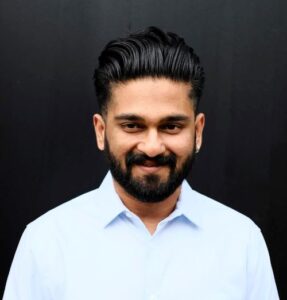
Dr. Raaj Gowrishankar is a fifth-year postdoctoral research fellow in the laboratory of Dr. Michael Bruchas, part of the Center of Excellence in Neurobiology of Addiction, Pain and Emotion (NAPE). Dr. Gowrishankar is a recent recipient of a K99/R00 grant from the National Institute on Drug Abuse to support his current work delineating how the endogenous opioid dynorphin coordinates goal-directed behavior. His long-term scientific and career goal is to be a leader and mentor in the field of neuroscience, with a special emphasis on understanding how goal-directed behavior is refined by neuromodulation.
Dr. Gowrishankar obtained a Master’s degree in Biomedical Engineering from the University of Florida and was recognized with an Achievement Award for Young Engineers. At UF, Dr. Gowrishankar conducted research in the laboratory of Dr. William Ogle where he developed novel opsins for synaptic modulation. He pursued a PhD mentored by Dr. Randy Blakely in the Neuroscience Graduate Program at Vanderbilt University and was funded by the Vanderbilt International Scholars Program and a fellowship from The Brain Institute.
Nearing the end of his graduate training, Dr. Gowrishankar developed a fascination with how neuromodulatory circuits led to goal-directed behaviors, underlying natural reward seeking and pathological drug use. He sought out Dr. Bruchas and joined the lab in 2018. While working in the Bruchas Lab, Dr. Gowrishankar discovered that inhibition of cholinergic transmission in the nucleus accumbens is necessary for reward reinforcement (Al-Hasani & Gowrishakar et al., Nature Neuroscience, 2021), developed rigorous tools for neuromodulatory inhibition of terminals with spatiotemporal precision (Copits et al., Neuron, 2021) in vivo, and more recently, characterized novel opioid biosensors for detecting opioid release in vivo (Dong & Gowrishankar et al., under review, 2023).
Outside of the laboratory, Dr. Gowrishankar enjoys cooking for his family and friends, hiking with his dog Denna, and attempting (albeit unsuccessfully) to convince everyone around him that cricket is better than baseball.
June 2023
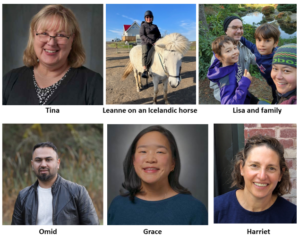
Omidullah Afzal is a member of the APM grants team working as a grants & contracts specialist. He helps PIs with their research portfolios. Omid’s responsibilities include daily post-award management of grants, budget monitoring, subcontracts management, progress reports, and closeout. Omid earned a BA in Language Literacy from Balkh University. He started his professional career in 2009 with a French organization, ACTED (Agency for Technical Cooperation and Development), as a reporting officer in North Afghanistan in the city of Maimana. In 2010 he moved to the European Union Police Mission for Afghanistan (EUPOL Afghanistan). In 2015 Omid joined USAID and supported development projects in central Kabul and the northern region of Afghanistan as a grants specialist and senior procurement officer. Omid joined UW’s Department of Global Health in 2020 and moved to APM in 2022. Outside of work Omid enjoys spending time with his family and friends. He also enjoys playing soccer, badminton and traveling.
Tina Backman joined the University of Washington in 1997 and has been with the department of Anesthesiology & Pain Medicine since June 2012. Tina majored in Art History, and serendipitously found her way to grants management through the recommendation of a friend. She enjoys the collaborative aspect of grants management, interacting with our own investigators and staff, as well as the wider research community, both within and beyond the University of Washington.
Leanne Cornel started as a basic science researcher in Pediatrics then moved to Anesthesiology in 2005. She has been in an administrative role since 2017 supporting various programs and faculty (Bonica Scholars, PPiQSO, Vice Chairs). Whilst admin work is very different from research bench work, she enjoys the challenges of keeping the programs running. Outside of APM, Leanne volunteers as a Child Passenger Safety Technician (educating caregivers on the proper use of child car seats) and likes to read historical fiction.
Lisa Flint is a Clinical Trials Coordinator who has been with APM for 14 years and UW for 25 years. After graduating UW with a Cellular/Molecular Biology degree she spent years at the bench and tissue culture hood studying Cystic Fibrosis and Diabetes but discovered her enjoyment of Clinical Research working on small studies in Rehabilitation Medicine. She spent her first few years in APM as an OB Anesthesia Research Coordinator but stepped in to assist the department with IRB reviews and has moved on to tackle additional Clinical Trial activities. She stays busy outside of work keeping up with her soccer-loving 9 and 11 year old boys, 80-lb dog, and grill loving husband.
Grace Yeung joined APM in 2021 after working in the aerospace industry for 17 years. Grace currently manages post award grant budgets and reporting. There are behind the scenes details that happen within UW, coordinating with OSP/ABC/GCA/other departments, and Grace does her best to handle those pieces so faculty can focus on their research. Outside of work Grace enjoys spending time with family, cooking, and gardening.
As Assistant Director for Research, Harriet Saxe’s primary responsibility is to support investigators, trainees and staff in their academic research pursuits. Harriet supervises the core research team and works with the Vice Chair for Research to foster a productive and collaborative environment for APM researchers. Ask Harriet anything about research administration at UW and she’ll try to find an answer for you. Harriet’s early professional career focused on legal representation for people with disabilities, followed by time at home with her 2 daughters, and eventually joined APM as a research coordinator. Outside of work Harriet is happiest in the great outdoors and traveling with her family.
May 2023
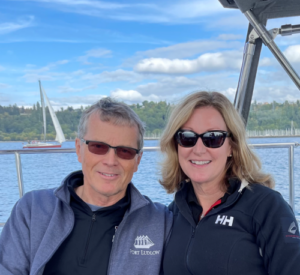
Stephan Thilen, MD, MS, Associate Professor, provides clinical services in the operating room and in the Pre-Anesthesia Clinic at Harborview Medical Center. Dr. Thilen’s clinical research focuses on prospective evaluations of approaches preventing residual paralysis. Dr. Thilen’s recent study published in Anesthesia & Analgesia is the first to completely prevent residual paralysis while keeping a significant role for inexpensive neostigmine. This protocol is identical to one implemented at HMC. Adherence by providers could potentially save several hundred thousand dollars in drug costs annually.
Dr. Thilen completed his residency training in Syracuse, NY. After residency, he ventured into the world of private practice, spending several years working as an anesthesiologist, and eventually becoming the medical director for anesthesiology in a community hospital in West Virginia. It was a fulfilling time, serving his local community and ensuring quality care for patients. Best of all, Dr. Thilen met his wife Kelly who was an ICU nurse.
However, thirst for intellectual challenges and a desire to make a broader impact led him back to academics in 2001. He embarked on a new chapter, pursuing a fellowship in critical care medicine and studying for a master’s degree in Population Health at the University of Wisconsin in Madison. It was a transformative period of growth and learning, providing him with a deeper understanding of healthcare and its implications for populations.
Fast forward to 2008, and Dr. Thilen found himself joining UW in Seattle. This academic environment offered him a platform to contribute to research and education in anesthesiology. During his time at UW, he had the privilege of working with exceptional mentors who played crucial roles in shaping his career. Standout names were Ed Weaver, an ENT surgeon, and Miriam Treggiari, whose guidance and support left a lasting impact. Marge Sedensky also provided valuable mentorship along the way. He was a T32 fellow 2010-12 and his research journey focused on health services and the impact of perioperative medical consultations. He recognized that this perioperative intervention had significant financial implications, with costs amounting to billions of dollars. However, there was limited knowledge about its indications, patterns of use, and effects on outcomes. Dr. Thilen decided to bridge these knowledge gaps. His research studies in this area were published in high-impact journals, including Anesthesiology and JAMA-Internal Medicine, showcasing the value and relevance of his work.
As the years progressed, Dr. Thilen’s focus shifted towards guiding improved perioperative practices with muscle relaxants and the prevention of residual paralysis. The large literature on this subject includes reports of multiple risk factors associated with this issue. One of Dr. Thilen’s notable studies, published in Anesthesiology in 2012, highlighted the significance of using eye muscles for neuromuscular monitoring as a significant risk factor for residual paralysis. By 2015, Dr. Thilen focused on prevention of residual paralysis and the development of a clinical protocol using neostigmine.
In 2021 and 2022, Dr. Thilen was a co-chair of the ASA Task Force charged with developing practice guidelines for monitoring and antagonism of neuromuscular blockade. The work included a systematic review, performed with the assistance of ASA’s professional methodologists. The final “product” is the first national US guidelines on this topic, they were published in the January 2023 issue of Anesthesiology and include 8 recommendations. Most importantly, they recommend the routine use of quantitative neuromuscular monitoring which has recently been implemented at UW-Montlake and Harborview.
When growing up in Sweden, Dr. Thilen learned to sail at a young age in the archipelago of Stockholm. Sailing has remained an important hobby and he will take every opportunity to sail on Lake Washington where he keeps a 22-foot sailboat, or in Puget Sound on friends’ boats. Although perhaps slightly less enthusiastic about waves and winds, his wife Kelly often comes along sailing, as in this picture of a return to Seattle from Port Ludlow on the Olympic Peninsula. Dr. Thilen and his wife Kelly love the Seattle area and raised three wonderful boys here.
April 2023
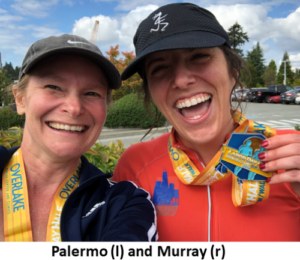
Caitlin B. Murray, PhD is an Assistant Professor and pediatric pain psychologist in the Department of Anesthesiology and Pain Medicine at Seattle Children’s Hospital. She grew up in Ithaca, New York, where the winters were cold, and the summers were “Gorges.” Growing up in a hard-working family, she became deeply aware of the power of persistence – that a determined attitude can be the most crucial driver in realizing personal or professional goals. This ingrained value has been a vital driving force during her pursuit of a career as a clinician-scientist in pediatric pain.
Dr. Murray’s journey began as an undergraduate at UNC-Chapel Hill, where she majored in psychology and was first exposed to psychological research focused on adults with chronic pain. Upon graduating in 2008, one of the most impactful experiences was her role as a post-baccalaureate student working under Dr. Tonya Palermo, where she was a study coordinator for her R01-funded project characterizing sleep problems in adolescents with chronic pain. This early exposure to pediatric pain research ignited a lifelong passion for contributing to innovative research and clinical knowledge that could directly help young people with chronic pain.
Consequently, Dr. Murray completed a doctoral degree in child clinical psychology from Loyola University Chicago (Chicago, IL). Her graduate studies focused on learning diverse research methodologies and analytic techniques. Subsequently, her experiences working with older adolescents and young adults (AYA) with chronic pain during her clinical training at Nationwide Children’s Hospital (Columbus, OH) were a turning point. She observed how AYA are more likely to become “lost” in the transition to adult care, struggling to take responsibility for their pain management in the face of increased demands of young adult life (e.g., entering college, workforce). Moreover, she discovered that most evidence-based psychological treatments were developed for children or middle-aged adults and were not tailored to the unique developmental needs of AYA.
These early clinical and research experiences affirmed Dr. Murray’s commitment to becoming a scientist-practitioner in pediatric pain. She was delighted to return to Dr. Palermo’s lab as a postdoctoral fellow at Seattle Children’s Research Institute (2017 –2021) to advance her training in pediatric chronic pain. In June 2021, she was thrilled joined the University of Washington School of Medicine Department of Anesthesiology and Pain Medicine as an Assistant Professor conducting clinical services in the Seattle Children’s Pain Medicine Clinic and developing her research program. Dr. Murray aspires to create psychological pain interventions tailored to AYA’s unique needs and characteristics. It is her career vision to improve existing digital tools for pain self-management by delivering experiences that are more personalized and precisely tailored to each AYA using advances in methodology and data analytics (e.g., AI and machine learning).
When not working, Dr. Murray finds immense joy in spending time with her two beautiful children, Leo (age 3) and Maya (age 1). Leo loves dinosaurs, puzzles, and ice cream. Maya loves to squeal and waddle after her older brother, often pretending to be a dinosaur herself to get his attention. Dr. Murray also enjoys reading fiction and spending time outdoors in the beautiful Pacific Northwest (and she doesn’t even mind the rain).
March 2023

Dr. Elisabeth Powelson’s interest in pain medicine began prior to graduate school when she worked at a methadone clinic and noticed many of the patients developed opioid use disorder after being prescribed pain medication. Her current T32 fellowship research with mentor Dr. Jennifer Rabbitts looks at integrating medical care and behavioral health care more effectively after trauma surgery. In the past two years, Dr. Powelson worked on projects that center around pain after major musculoskeletal surgery in adolescents and writing grants to study older adults after musculoskeletal trauma. Her goal is to learn more about what causes the development of chronic pain in trauma patients and implement interventions in the perioperative period to decrease the incidence of chronic pain in musculoskeletal trauma.
Dr. Powelson grew up in Berkeley CA and attended UC Santa Barbara for undergraduate in Biopsychology. She attended UCSF (University of California, San Francisco) and UCB (University of California, Berkeley) Joint Medical Program for medical school and a MSc. In 2014, she began her residency at UW then did a pain fellowship and is currently in the T32 research fellowship program. She works clinically at the Center for Pain Relief at Roosevelt and in the OR at Harborview Medical Center.
In Seattle, Dr. Powelson met her husband and had her son Matthew (5) while in residency. She had lived in Montlake since 2020 when their son Thomas (2) was born. She spent her summers in the Sierras, and her sister works for the Tahoe National Forest. Dr. Powelson likes to backpack, camp, ski, and recently discovered a love of gardening. When not working, she loves to garden and cook with her children.
February 2023

As lab manager for the Bruchas Lab at the UW Center of Excellence in Neurobiology of Addiction, Pain, and Emotion (NAPE), Azra Suko, PhD supervises 31 lab members ranking from undergraduate students through postdoctoral fellows. As a Research Scientist, Dr. Suko assists Dr. Bruchas with multiple research projects regarding dissection of neural circuit involved in behavioral affect. The Bruchas Lab studies of the neurobiological basis of anxiety, depression, addiction and pain using rodent models of behavior and cutting-edge neuroscience approaches, including genetic, physiological, imaging, optogenetic, and viral manipulations. Additionally, Dr. Suko is responsible for the cloning of cDNA and pAAV constructs, AAV viral packaging, molecular biology, and biochemistry studies as well as laboratory management. Dr. Suko says her most significant accomplishment in the lab is developing a method for a rapid and efficient process for production and purification of AAV viruses necessary for brain circuit tracing.
Dr. Suko received her bachelor’s degree in Biochemistry and PhD in Bioresource Science and Engineering from the University of Washington. After losing her father to cancer in 2019, Dr. Suko decided to join the Bruchas lab and take on the epic challenge to help find new ways to treat pain.
Over the past couple of years, Dr. Suko has successfully managed to unite all lab members (trainees and undergraduate students) into a very hard-working, enthusiastic team, that ultimately led to very productive period in science in the Bruchas lab despite pandemic challenges. In a short time, she brought together her managerial and administrative skills and knowledge of safety and lab procedures to ensure that the lab operates smoothly while also conducting scientific procedures and assisting others in the lab. Her goal is to effectively motivate the lab members to exert more necessary effort to attain their set goals. With guidance from Dr. Michael Bruchas, the lab has seen massive success and hopes to keep growing as a group.
Azra escaped from the genocide in Bosnia in 1996 and since then has lived in Kirkland, WA. Outside of the laboratory, Dr. Suko enjoys watching her son and daughter play and compete in tennis. Her son is a sophomore playing for the UW men’s tennis team while her daughter is a first-year student and plays for the UW women’s tennis team.
January 2023

See Wan Tham, MBBS, MS is an Associate Professor of Anesthesiology and Pain Medicine whose research interests focus on understanding the intersection between sleep, pain and physiological markers, and their impact on child health and quality of life across different pediatric pain conditions. Dr. Tham’s research is funded by the National Institute of Diabetes and Digestive and Kidney Diseases K23 Mentored Patient-Oriented Research Career Development Award. The goals of the proposed study are to investigate the longitudinal trajectories of pain experiences, sleep disturbances, and autonomic function in adolescents with chronic abdominal pain.
Dr Tham was born in Malaysia, and spent her childhood years in a number of East and Southeast Asian countries. Immersion in the different cultures, languages, and environments had nurtured her sense of adventure. She decided to study medicine at the University of Sydney in Australia in 2001. She pursued her passion for anesthesiology, completing residency at the State University of New York (Syracuse), and fellowship at Seattle Children’s Hospital. She then sought intensive research training through the APM National Institutes of Health T32 research training program under the mentorship of Dr. Tonya Palermo, who also serves as her primary mentor on the K23 award. During her early training, she discovered her passion for pediatric pain medicine, and aligned her research and clinical endeavors. She provides clinical services on the Inpatient Pain Service consultation and multidisciplinary Pain Management Clinic at Seattle Children’s Hospital. She had also partnered with other specialty services, including the Chronic Pancreatitis and Orthopedic Limb Lengthening clinics, is collaborating with the pediatric gynecology team on establishing the Chronic Pelvic Pain Clinic. She thrives on her clinical work, which drives her dedication to investigate the risk factors that perpetuate pain symptoms.
Seattle has now emerged as the city were Dr. Tham has resided for the longest duration! She and her family love all the adventures of the Pacific Northwest. She has discovered trail running, and her favorite event to date is the Ancient Lakes Trail Run along the Columbia River Gorge that passes through the desert lakes of central Washington. Seattle also has a rich diversity of cuisines that she has come to love throughout her childhood, that she and her family often delight in. She is grateful for all the incredible opportunities of this city, UW APM and Seattle Children’s Hospital and Research Institute.

 tant Professor, pediatric anesthesiologist, and a new Principal Investigator at the Seattle Children’s Research Institute. He is thrilled to start his research program that aims to develop precision anesthesia by better understanding the brain’s arousal circuits and generating new technology to better modulate these circuits. His long-term goal is to produce anesthesia with reduced cardiorespiratory depression and decreased risk of perioperative neurocognitive disorders such as delirium. Additionally, he is strongly interested in developing physician-scientists in our field.
tant Professor, pediatric anesthesiologist, and a new Principal Investigator at the Seattle Children’s Research Institute. He is thrilled to start his research program that aims to develop precision anesthesia by better understanding the brain’s arousal circuits and generating new technology to better modulate these circuits. His long-term goal is to produce anesthesia with reduced cardiorespiratory depression and decreased risk of perioperative neurocognitive disorders such as delirium. Additionally, he is strongly interested in developing physician-scientists in our field.

 Durba Banerjee, PhD,
Durba Banerjee, PhD, Melissa Herrero Bocco, PhD, is a dual citizen of Argentina and Italy, Dr. Herrero Bocco was awarded a PhD from the School of Molecular Cell Biology and Biotechnology at Tel Aviv University. Since joining the Tian lab in 2021, Dr. Herrero Bocco’s research is focused on understanding the involvement of mitochondria and cell metabolism dysfunction and their adaptative mechanisms in pathological scenarios.
Melissa Herrero Bocco, PhD, is a dual citizen of Argentina and Italy, Dr. Herrero Bocco was awarded a PhD from the School of Molecular Cell Biology and Biotechnology at Tel Aviv University. Since joining the Tian lab in 2021, Dr. Herrero Bocco’s research is focused on understanding the involvement of mitochondria and cell metabolism dysfunction and their adaptative mechanisms in pathological scenarios.






